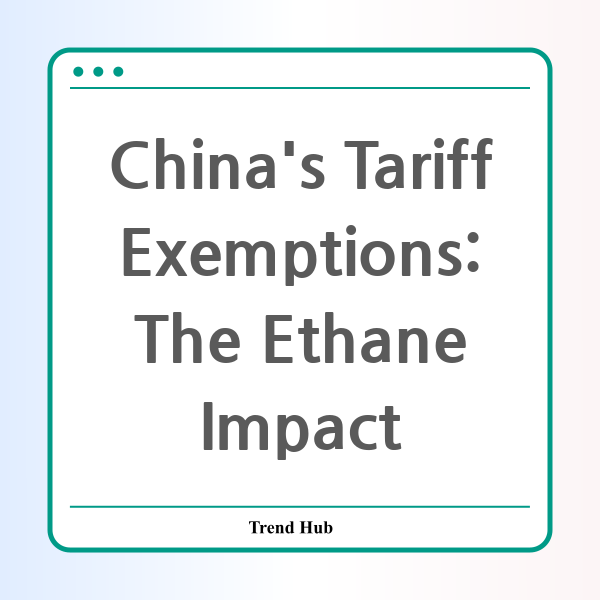* This website participates in the Amazon Affiliate Program and earns from qualifying purchases.

As the ongoing trade tensions between the United States and China continue to evolve, an unexpected development has emerged regarding ethane tariffs that could have significant implications for both nations. With the recent decision by China to waive a 125% tariff on U.S. ethane imports, the complexities of international trade and energy markets are coming into sharper focus.
China's decision to exempt ethane is particularly noteworthy, as the United States is a major supplier of this key chemical compound used in a variety of industrial applications, particularly in the production of plastics and synthetic fibers. According to the U.S. Energy Information Administration, China purchases about half of America’s ethane exports, making it a crucial market for U.S. producers. Key players in the ethane sector, including Chinese companies like Satellite Chemical, SP Chemicals, and Sinopec, depend heavily on these imports to fuel their operations.
Understanding Ethane Tariffs
Initially imposed as part of China’s broader retaliation against U.S. tariffs, the hefty 125% levy on ethane imports aimed to exert pressure on the U.S. economy. However, this recent tariff exemption signifies a strategic move by Beijing to alleviate some of the self-imposed economic pressures, particularly given the significant role ethane plays in its manufacturing sector.
Furthermore, China has been proactive in creating a whitelist of U.S. goods exempt from tariffs, indicating a willingness to negotiate and ease some of the burdens of the trade war. While the details of this whitelist remain unclear, reports suggest that it also includes exemptions for pharmaceuticals, microchips, and aircraft engines, highlighting the critical nature of U.S. technologies in various sectors of the Chinese economy.
The Business Implications
The implications of the ethane tariff exemption extend beyond mere numbers. For U.S. companies such as Enterprise Products Partners and Energy Transfer, this could mean a renewed competitive edge in supplying a critical raw material to Chinese industries. Both companies can now navigate the complexities of international trade more effectively, potentially leading to increased export volumes and strengthened business relationships.
Moreover, the exemption allows Chinese manufacturers to stabilize their supply chains and maintain production levels, which is essential given the volatility in costs associated with tariff-induced price hikes. The decision could also mitigate the risk of job losses in both countries, as a disruption in the ethane supply chain could have cascading effects across various industries.
Global Trade Dynamics
China's move comes amid broader discussions regarding the sustainability of high tariffs and their impact on both economies. U.S. officials have suggested that continued tariff pressure on China could lead to significant job losses in the Chinese market. This context is crucial as it demonstrates that economic realities often compel governments to reconsider their trade strategies, especially when faced with the prospect of job insecurity and economic downturns.
The dialogue between the two nations remains complex, and while recent developments are promising, they also reflect the underlying tensions inherent in international trade relationships. As companies in both countries navigate these changes, it will be essential to stay informed about ongoing developments that could impact market conditions.
Conclusion
The exemption of the 125% tariff on ethane exports to China represents a pivotal moment in the trade war between the U.S. and China. It underscores the importance of ethane within the global economy and illustrates how strategic tariff adjustments can influence business operations, market stability, and international relations. As both nations continue to grapple with prevailing trade tensions, the focus remains on finding common ground that can benefit both economies, ultimately leading to a more balanced and sustainable trade environment.
* This website participates in the Amazon Affiliate Program and earns from qualifying purchases.